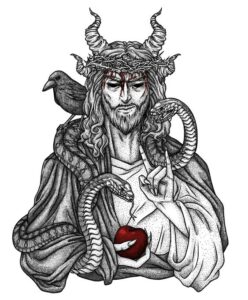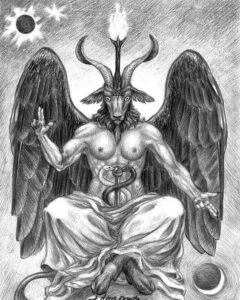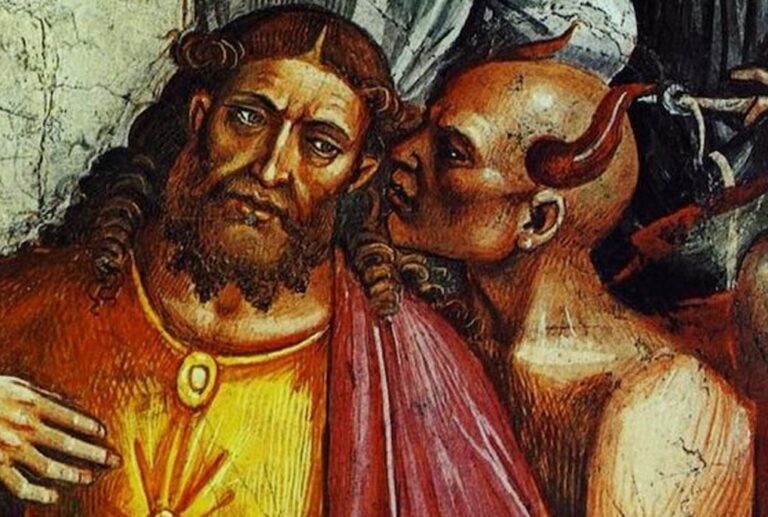Table of Contents
Who is He?
The Antichrist, as perceived in certain Christian eschatological beliefs, is an individual characterized as an opponent or adversary of Christ. According to interpretations of biblical texts, particularly in the books of Daniel and Revelation, the Opponent of Christ is expected to emerge during the end times. This figure is often described as charismatic, deceptive, and wielding significant influence, leading many away from the teachings of Christianity. The concept of the Antichrist is intricately tied to prophecies about the final judgment, the Second Coming of Christ, and the culmination of events associated with the end of the world. Different Christian denominations and scholars may hold diverse interpretations regarding the nature, identity, and timing of the appearance of the Figure.
Characteristics

Physical Description: Biblical texts do not provide a specific physical description of the Antichrist. Interpretations often focus more on symbolic and spiritual aspects, emphasizing the figure’s opposition to Christ rather than specific physical features.
Personality: The Antichrist is traditionally characterized by a charismatic and deceptive personality. This figure is believed to possess the ability to sway masses and lead them astray from Christian doctrines, embodying qualities contrary to the teachings of Jesus.
Special Abilities: In Christian eschatology, the Antichrist is not typically associated with supernatural or magical abilities in the way some fictional characters might be. Instead, the emphasis is on the figure’s ability to deceive and exert influence over people, often in ways that run counter to Christian virtues.
Cultural Representation
The Antichrist holds a prominent place in cultural representation, particularly within Christian traditions. Artists, writers, and theologians have depicted the Antichrist in various forms, contributing to a rich tapestry of visual, literary, and performing arts that explore the concept’s symbolic and eschatological significance.
Origin:
The concept of the Antichrist finds its origin in biblical texts, primarily in the books of Daniel and Revelation in the Christian Bible. Throughout history, theologians and scholars have interpreted these passages to develop the idea of an adversary who opposes Christ, gaining prominence in Christian eschatology.
Protestant Reformation:
The Antichrist played a notable role in discussions and debates during the Protestant Reformation of the 16th century. Reformers, such as Martin Luther and John Calvin, engaged with the concept in their critiques of the Catholic Church, viewing certain practices and doctrines as aligning with the perceived characteristics of the Antichrist as described in biblical prophecy.
The Reformers’ interpretations contributed to the shaping of Protestant theology and ecclesiology, impacting not only religious beliefs but also influencing political and cultural developments during this transformative period in Western history.
Modern Appearances

Popular Culture:
The Figure continues to make appearances in various forms within modern popular culture. Literature, films, television series, and music often explore and reinterpret the concept, portraying the figure in diverse ways that reflect contemporary anxieties, fears, and cultural perspectives.
Art and Media: Artists and creators actively engage with the concept of the Antichrist in contemporary art and media. Visual artists, filmmakers, and writers use their work to offer unique interpretations of the figure, contributing to ongoing discussions about spirituality, morality, and the end times.
Religious Discourse: The concept of the Antichrist remains a subject of discussion within religious discourse. Some Christian denominations and theologians continue to explore and interpret biblical prophecies related to the Antichrist, applying these interpretations to contemporary events and societal shifts.
Political and Social Commentary: Discussions about the Antichrist occasionally find their way into political and social commentary. In some instances, individuals or groups may use the concept rhetorically to express opposition to perceived moral or political adversaries, drawing on the symbolic weight associated with the figure in religious traditions.
Evangelical and Apocalyptic Movements: Certain evangelical and apocalyptic movements actively engage with the idea of the Antichrist. These groups may interpret current events as signs of the impending end times and may look for or identify individuals or entities as potential embodiments of the Antichrist.
Antichrist FAQ
Who is the Antichrist?
The identity of the Antichrist is not explicitly revealed in the Bible. Various interpretations and speculations exist within Christian traditions.
What does the Bible say about the Antichrist?
The Bible, particularly in the books of Daniel and Revelation, provides symbolic and prophetic descriptions of the Antichrist. The figure is associated with opposition to Christ and may be linked to apocalyptic events.
Where will the Antichrist come from?
The Bible does not specify a geographical origin for the Antichrist. Interpretations on this aspect vary among different Christian traditions.
What is the Antichrist?
The Antichrist is a figure or force that opposes Christ and is associated with end-time events in Christian eschatology.
Who will be the Antichrist?
The Bible does not explicitly reveal the identity of the Antichrist. Speculations about the identity of the Antichrist have existed throughout history, but these are often subjective interpretations.
What does Antichrist mean?
The term "Antichrist" means an opponent or adversary of Christ. It is derived from the Greek "anti Christos."
What will the Antichrist look like?
The Bible does not provide a physical description of the Antichrist. Descriptions often focus on symbolic and spiritual characteristics.
Who is the third Antichrist?
The concept of the "third Antichrist" is not explicitly mentioned in biblical texts but may be associated with interpretations of apocalyptic prophecies.
When will the Antichrist come?
The timing of the appearance of the Antichrist is a subject of debate and interpretation within Christian eschatology. The Bible provides various symbolic timelines associated with end-time events.
Where is the Antichrist?
The Bible does not specify a specific location for the Antichrist. Interpretations on this matter differ among Christian traditions.
Who could be the Antichrist?
Speculations about the identity of the Antichrist have existed throughout history, with some historical figures and political leaders being suggested by various individuals or groups.
What will the Antichrist do?
The Antichrist is often associated with deceiving people and leading them away from Christian teachings. The specific actions attributed to the Antichrist vary in interpretations.
When is the Antichrist coming?
Predictions about the timing of the Antichrist's appearance are not explicitly stated in the Bible and are subject to varied interpretations.
What is the name of the Antichrist?
The Bible does not provide a specific name for the Antichrist, and interpretations of any potential names are speculative.
Where does the Antichrist live?
The Bible does not specify a residence for the Antichrist. Interpretations on this aspect differ among Christian traditions.
What country will the Antichrist come from?
The Bible does not identify a specific country of origin for the Antichrist. Interpretations on this matter vary among different Christian perspectives.
Who is the Antichrist today?
Identifying the Antichrist in contemporary figures is a matter of personal interpretation, and views on this may differ widely among individuals and religious communities.
Where is the Antichrist born?
The Bible does not specify the birthplace of the Antichrist. Interpretations on this aspect vary among Christian traditions.
Who did Nostradamus predict to be the Antichrist?
Nostradamus, a 16th-century French astrologer and prophet, is often cited in discussions about the Antichrist, but his writings are highly symbolic, and interpretations are subjective.
Who will be the Antichrist and false prophet?
The identity of the Antichrist and the false prophet is not explicitly detailed in the Bible. Views on these figures vary among Christian eschatological interpretations.




